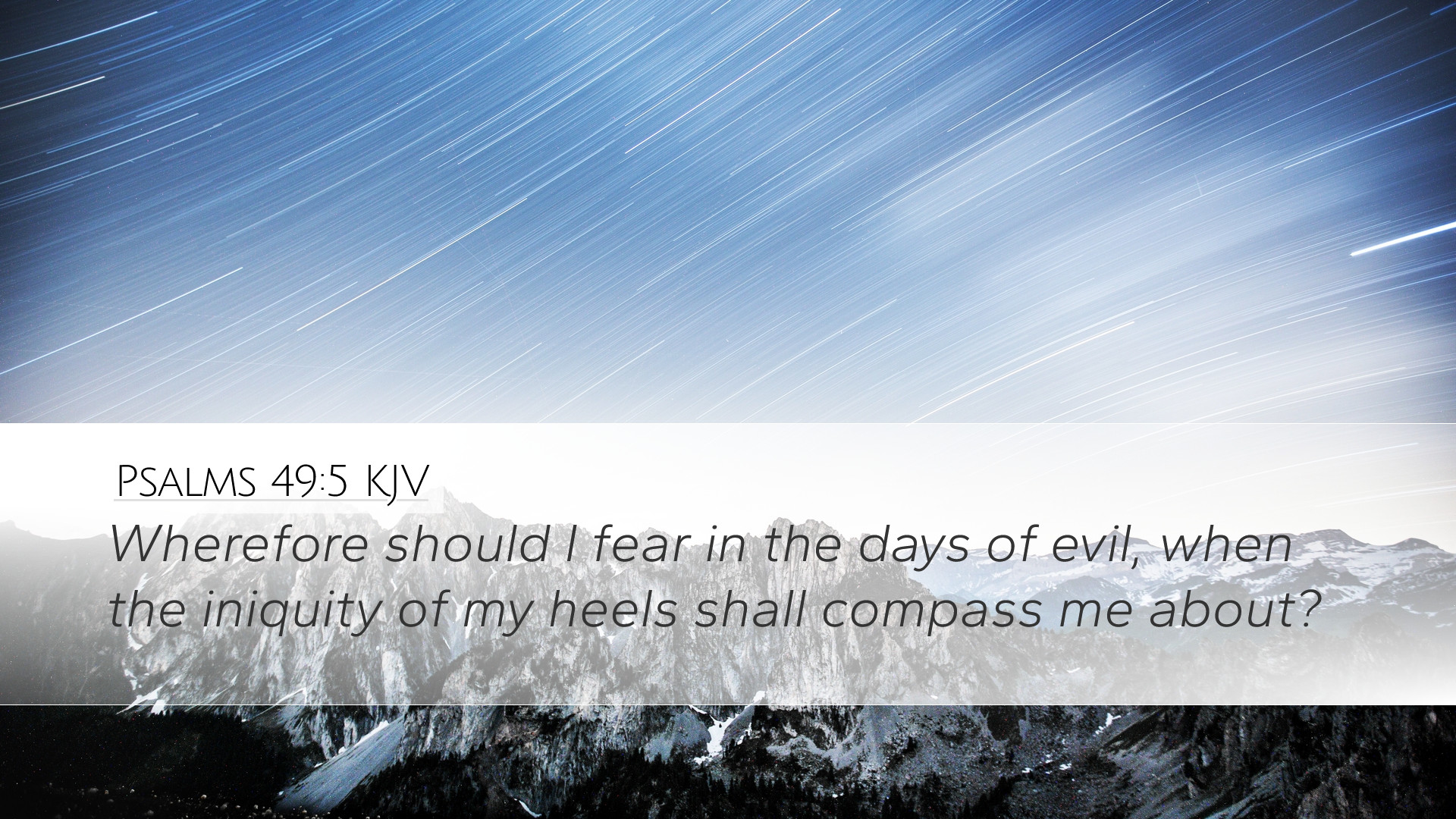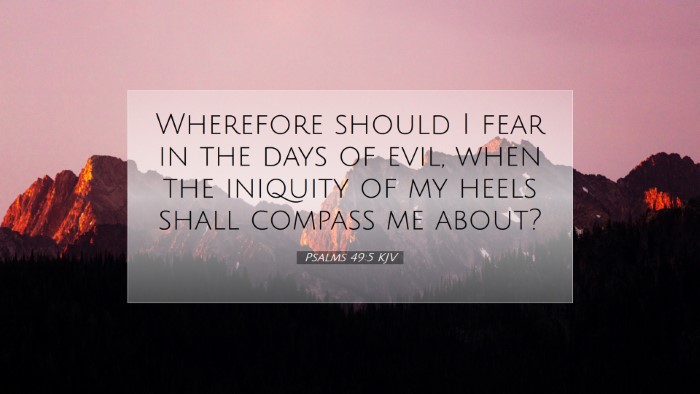Commentary on Psalms 49:5
Psalm 49:5: "Wherefore should I fear in the days of evil, when the iniquity of my heels shall compass me about?"
Introduction
The 49th Psalm presents profound reflections on wealth, mortality, and divine justice. It serves as a meditation on the vanity of trusting in earthly treasures and the ultimate fate of humanity. The verse in question, Psalms 49:5, encapsulates the tension between earthly fears and the assurance in God amidst the trials of life. Various commentators provide insights that highlight the psalmist’s understanding of fear, sin, and the hope found in God.
Contextual Overview
This psalm is attributed to the sons of Korah and addresses the themes of wisdom and understanding in relation to earthly possessions and the fate of the wicked. The psalmist juxtaposes the transient nature of wealth with the permanence of spiritual matters. In this framework, verse 5 becomes a crucial declaration of the believer's confidence in God during perilous times.
Commentary Insights
Matthew Henry’s Commentary
Henry emphasizes the psalmist’s rhetorical question regarding fear during days of trouble. He observes that the days of evil refer to times of distress caused by sin or calamity. The phrase "iniquity of my heels" suggests a feeling of being pursued or surrounded by sin. Henry notes that such a state should not induce fear in the righteous, as their trust in God provides a basis for confidence. He underscores the importance of understanding whose power ultimately matters—the fear of man is eclipsed by the trust in the Almighty.
Albert Barnes' Commentary
Barnes expands on the concept of 'fear in the days of evil', commenting that the psalmist’s assurance reflects a deep-seated trust in God's providence and justice. He interprets 'the iniquity of my heels' as a metaphor for persistent sin that ensnares people. Barnes suggests that while the wicked may prosper, the psalmist is reminded that such prosperity is temporary, and ultimate accountability lies with God. This resonates with the theme of divine justice prevalent throughout the psalm.
Adam Clarke’s Commentary
Clarke notes the significance of fear in relation to sin. He interprets the 'days of evil' as moments when trials reveal the integrity of an individual’s faith. Clarke emphasizes that when one's sins surround them, it is critical to remember the promise of God’s deliverance. He highlights the value of spiritual assurance that allows the believer to remain steadfast. Clarke's thoughts echo the sentiment that, despite the presence of sin, an unwavering faith in God’s mercy should alleviate fear.
Theological Implications
This verse invites deeper theological reflection on the nature of fear, sin, and faith. It conflates human experience under duress with the promise of divine presence. When interpreting Psalms 49:5, scholars can draw upon several key themes:
- Faith Over Fear: The psalmist’s rhetorical query challenges believers to confront their fears with faith—the essence of spiritual resilience.
- The Nature of Sin: The imagery of being encircled by iniquity emphasizes the pervasive influence of sin in life, yet it also calls for acknowledgment of divine grace.
- Mortal Contrasts: The juxtaposition between transient earthly concerns and eternal truths presents a critical discourse on priorities in the Christian life.
- Divine Justice: Assured trust in God’s justice encourages believers to resist despair even when faced with sin and moral failures.
Application for Pastors and Leaders
Pastors and church leaders can draw upon the insights from this verse to encourage congregations facing moral and ethical challenges. The acknowledgment of fear and the prevalence of sin in their lives resonates deeply with many believers. Leaders are encouraged to:
- Provide pastoral care that acknowledges the reality of fear but redirects focus towards faith in God’s promises.
- Encourage accountability and confession as a means of addressing 'the iniquity of our heels' and fostering a community of grace.
- Teach about the eternal perspective of God's kingdom versus the temporal nature of earthly challenges, promoting hope among believers.
Conclusion
Psalms 49:5 offers a profound reflection on the relationship between fear, sin, and faith. As articulated through the lens of several classic commentators, this verse serves as a call to embrace divine trust amidst life's uncertainties. Faithful believers are invited to recognize that, while iniquities may surround them, the faithful reliance upon God will provide strength and certainty in challenging times.


